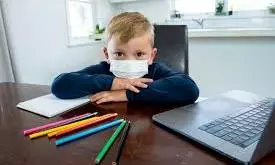
An organized lifestyle will help children cope with the pre and post COVID period
text_fields"COVID-19 pandemic has forced children to stay inside their house, stopping them from going out to play and meet their friends. This can impact their mental health and cause anxiety, irritability and other symptoms", says Senior Consultant Dr V.R. Reena from LMonk Solutions. She was talking to Media One news channel about how the arrival of pandemic and sudden lockdown of schools has turned the children's life upside down and how to make it easy for them.
"Deprived of any opportunity to play and interact with their peers in person, young people are at risk of losing such skills. And instead of developing confidence and self-assurance, they are in danger of feeling isolated and insecure. On top of this, they are likely to have feelings of despair, fear and helplessness as the virus disrupts their lives," she added. "Unexpected changes in the routine like frequent hand washing, sanitizing, wearing of masks etc. might be disturbing for children. Disruption of their earlier timetable to untimely food habits, over screen time with unlimited internet and hardly any physical activities lead to excessive or no sleep, obesity and screen addiction', she explains.
She further adds that with the lockdown in place, there is a lot of negativity; children don't have a fixed schedule; they have their parents and siblings around them all the time. This leads to rivalries and fights, often ending with harsh comments on children. Together these things can lead to anxiety, panic attacks, depression, irritability, change in sleep patterns, unnecessary and uneventful crying episodes and violence.
"A regular, systematic schedule with a proper time for all kids' activities including eating, studying, playing, and even screen watching, should be prepared. Include yoga or any form of exercise in it," she said. According to Dr Reena, giving a pet to your younger one will increase their activeness and help reduce the loneliness they face. Also, she states that parents must spend quality time with their kids. "Help the kid take up a hobby, encourage him/her to do all kinds of physical activities." she suggests.
Post-COVID return to school and classroom study might get difficult as the children might find it stressful to conform to timetables, timely note completion and extracurricular activities. Some issues may be short term while others are long term. Uncontrolled weight gain during the pandemic also poses movement issues once they are out. Idleness and disinterest in studies and physical activities may occur. Post-COVID exposure to pollution might attract serious illnesses. Another problem is screen addiction that prolongs even after the pandemic.
For kids to reconnect and communicate well with the outside world post-pandemic, the therapist advocates parents to follow a disciplined routine for children that allows time for a proper diet, schooling, hygiene practices, gadget usage, outdoor games and family chit-chats.
Most children will manage well with the support of parents and other family members, even if they are showing signs of some anxiety or concerns, such as difficulty sleeping or concentrating. Parents and caregivers should provide reassurance and guidance to help children cope with it all.






















